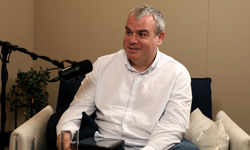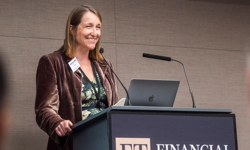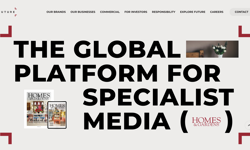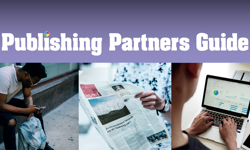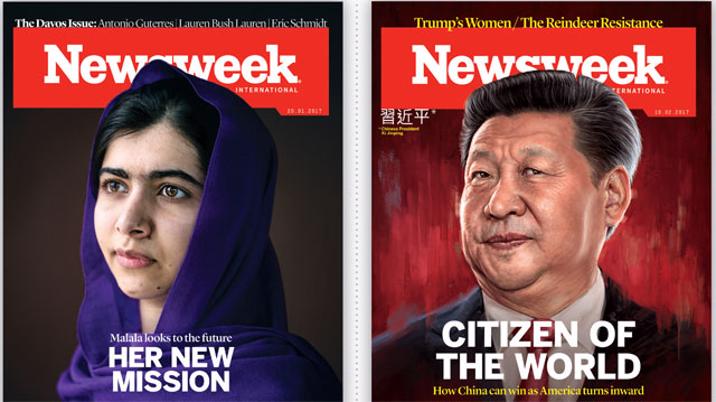
Closer collaboration between Europe and the US and an upscaling of activity in Asia follow a challenging period for Newsweek during which time its owner, IBT Media, has grown its presence in London while cutting staff in the US. But according to Greg Witham, the company’s first chief operating officer in the UK, the combined effects of Newsweek’s global brand recognition and its owners’ digital-first mind-set are now driving rapid international growth.
The bumpy times recently experienced by Newsweek have been well-documented.
Launched back in 1933 by a former editor at rival Time, the magazine was acquired by The Washington Post Company in 1961, restructured to refocus on opinion and commentary in the face of the rise of online news in 2009, sold for $1 following two years of losses then merged with online publication The Daily Beast in 2010, redesigned in 2011 and ceased print publication in the US in 2012.
Then, in 2013, Newsweek, the brand and its online publication were acquired by American global digital news organisation IBT Media, publisher of International Business Times (IB Times) – an online-only title with seven country editions in four languages which generate 55m monthly global uniques. A year later, Newsweek was re-launched with an unexpected return to print.
Three years on, Newsweek’s total circulation now stands at 205,000 (print and digital editions, combined) with 100,00 of this from North America; 75,000 from Europe; and 30,000 from Asia. Combined circulation, including licensed foreign language editions, is 434,500. Newsweek.com, meanwhile, generates 15.6m monthly unique visits with 12.1m from North America and 3.03m from Europe, the Middle East, Africa and Asia. And, according to Google Analytics, the site has a 12 minute average dwell time.
Witham, former group publishing director for Cosmopolitan, Digital Spy and Sugarscape at Hearst UK, says the combination of Newsweek’s brand heritage and IB Times’ scale was a major attraction. And though his brief was to oversee IBT Media’s further international expansion, Newsweek has been a particular focus since he joined the business in March 2016.
“Newsweek had been off the newsstands for a couple of years and its presence back on the newsstand perhaps wasn’t as well publicised to advertisers as it could have been. We needed to work quickly to re-package the product for advertisers,” he explains.
More targeted approach
A new strategy was already in place to target a smaller number of higher net worth decision-making individuals than the title had targeted in its previous incarnation.
The editorial proposition had also been tweaked with a mix of longer-form, in-depth pieces of up to 12,000 words; a slicker design and better quality paper stock; and shorter, newsier content and analysis (with selected, longer reads of 2-3,000 words online). However, the “US-led deep dive behind the news” agenda Newsweek has always been known for remains a constant across online and print.
The idea was to attract more luxury advertising clients. But to do this effectively, it needed to refine its approach to marketing and circulation and both have been priorities for Witham in the months since his arrival.
“Newsweek’s old model was mass circulation driven by subscriptions. As we are now running the business with a more tightly targeted subscriptions and newsstand base, we market subscriptions globally; we are on newsstands in relevant places; and we now have a more targeted distribution model around premium spaces,” he explains.
“It’s all about getting the brand in the hands of the target consumer whatever way they choose to engage with us, and advertisers are happy with such a hybrid model of distribution - as long as we can demonstrate we are getting Newsweek in front of the right people at the right time.”
IBT Media’s “digital-first mind-set” was another draw, though Witham is quick to stress that while the corporate culture is digital-first – flexible, agile and so on – Newsweek itself is neither digital or print-driven.
Instead, the print product is one of a number of touchpoints for consumers and advertisers. Other touchpoints include a new series of Newsweek-branded events being developed by IBT Media’s recently-launched events division, the first of which – AI & Data Science Capital Markets – takes place in March.
Each brand component works in unison and “absolutely complements each other”, he insists.
It goes without saying that legacy systems and structures from the print-only publishing era have proven a major challenge for many in today’s publishing marketplace. But, it seems, the ability to re-tool for its print re-launch - in effect from scratch – left Newsweek better-placed.
“The opportunity was to bring the print product back because it would operate under a different business model. We are not now obsessed by chasing millions of subscribers per issue to keep print advertisers happy and page rates up. The whole paradigm has shifted,” Witham comments.
“The opportunity for us in print is from having a high cover price and the fact that news weeklies are experiencing a relatively buoyant time. The aim is to be able to provide in-depth analysis. Newsweek readers do make an appointment to read Newsweek - and the print product is at the very core of that.”
Another recent development designed to bolster the new Newsweek proposition was the removal of its online paywall in early 2016 - a step intended to drive subs by making more content more readily accessible; to make the site act as a shop window. So, today, revenue comes from print and digital subscriptions, advertising and commercial partnerships including brand content through recently-launched dedicated division IBTailored.
While print circulation remains stable, digital revenues of all kinds are rising fastest as digital users grow. Digital traffic for Newsweek.com’s European edition, for example, has risen especially fast: over the past twelve months, for example, it increased from half a million to between four and five million monthly uniques.
London-driven
This, in part, explains the company’s recent expansion of its London-based operation, currently home to 138 staff who generate the bulk of Newsweek’s European, African and Asian content - almost as many as the 160 staff based in the US. But there is another reason for London’s growing importance: IBT Media’s ambitions for growth throughout Asia.
Not only is the population in Asia growing rapidly, digital advertising in the region is growing, fast.
According to IPG Mediabrands’ research arm MAGNA, total ad spend will grow 5.4% in Asia compared with growth of just 1.7% in North America this year. As a result, IBT Media now sees Asia as key to its future development. And to meet growing demand for trusted media brands from across the region, it recently combined and renamed its former Newsweek EMEA and Asia editions into a single, combined offering: Newsweek International.
“Newsweek Asia suggested Asian news or a US take on Asia. Newsweek International rightly positions itself as global news for global people,” explains Witham. “From a consumer perspective, our readers view themselves as international people so to pigeonhole yourself as an Asian or a European read was limiting from a brand perspective.”
London provides an essential hub for the US-owned business to grow business globally thanks to a central time zone that enables editorial and advertising across the US, Europe and Asia to be managed seamlessly, and a ready supply of publishing talent, he adds.
Asia reporter Ellie Ross, who joined Newsweek in February, is the latest in a line of Asia specialists to be taken on in London. Others, meanwhile, will be recruited locally as the company builds up its network of Asian bureaux in coming months. Once they are in place, Newsweek’s 24-hour news operation will be more comprehensive and more aggressive.
With experts on the ground and highly knowledgeable about latest developments in the US and Europe, Witham stresses Newsweek is ideally-set to deliver insight and analysis about Donald Trump’s presidency and Britain’s withdrawal from the EU – two stories set to be major and on-going in their relevance and likely impact for decision-makers around the globe over the next few years.
“My biggest concern is that any shock in the economy will potentially have an impact on marketing budgets and result in advertiser fall back – and that’s a bigger worry than trade and tariffs. But the up-side is we are well-positioned to report on the implications of Brexit and President Trump as well as content about Asia, and a truly international perspective is what the repositioning as Newsweek International will give,” he adds.
For the time being, prospects for the brand internationally appear rosier than in the US where in recent months IBT Media has laid off a number of staff. For rather than cut costs, investment in Newsweek International continues. The recent introduction of a new Features & Trending desk to monitor up-to-the-minute trending topics online and help shape the London base’s future news operation is one example. The launch in March of Newsweek International’s new Weekend section covering “the good things in life”, including culture and travel, is another.
Attention is now on the significant potential for further international growth in digital and this will be driven by on-going enhancements to the editorial product along with brand recognition, Witham predicts. So, efforts to build Newsweek journalists’ reputation for expert knowledge and thought leadership are being stepped up.
Brand recognition will also help the business build Newsweek’s share of native advertising – another important objective. Another priority for coming months is to grow the volume of high quality brand content Newsweek creates for its commercial partners with international tone and outlook being a core USP.
Many opportunities now exist for Newsweek in the international marketplace, Witham believes.
“Speed of execution is probably our biggest challenge, because of the time it takes to build business globally,” he notes. “But this is a young business in a robust sector and the attitude here is very much if you want to do something, then you can.”
Without doubt, the resurrection of Newsweek has been swift and ambitious. The question now, though, is the extent to which the brand’s digital native owners can recapture the brand’s past glories through a strategy that is digital and print hybrid.


